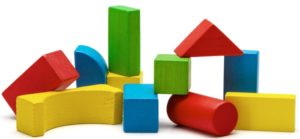 More evidence that traditional toys and books are superior to electronic toys in both verbal parent-child interactions and non-verbal interactions for young children. Parent-child verbal interactions are so important because they teach young children language, lay the groundwork for literacy skills, teach role-playing, teach emotional and social skills such as turn-taking and accepting others' leads. In other words, put down the electronic gadgets and go spend time talking and interacting with your young child with old style traditional toys and books. From Science Daily:
More evidence that traditional toys and books are superior to electronic toys in both verbal parent-child interactions and non-verbal interactions for young children. Parent-child verbal interactions are so important because they teach young children language, lay the groundwork for literacy skills, teach role-playing, teach emotional and social skills such as turn-taking and accepting others' leads. In other words, put down the electronic gadgets and go spend time talking and interacting with your young child with old style traditional toys and books. From Science Daily:
How does type of toy affect quantity, quality of language in infant playtime?
Electronic toys for infants that produce lights, words and songs were associated with decreased quantity and quality of language compared to playing with books or traditional toys such as a wooden puzzle, a shape-sorter and a set of rubber blocks, according to an article published online by JAMA Pediatrics.
Anna V. Sosa, Ph.D., of Northern Arizona University, Flagstaff, and colleagues conducted a controlled experiment involving 26 parent-infant pairs with children who were 10 to 16 months old. Researchers did not directly observe parent-infant play time because it was conducted in participants' homes. Audio recording equipment was used to pick up sound. Participants were given three sets of toys: electronic toys (a baby laptop, a talking farm and a baby cell phone); traditional toys (chunky wooden puzzle, shape-sorter and rubber blocks with pictures); and five board books with farm animal, shape or color themes.
While playing with electronic toys there were fewer adult words used, fewer conversational turns with verbal back-and-forth, fewer parental responses and less production of content-specific words than when playing with traditional toys or books. Children also vocalized less while playing with electronic toys than with books, according to the results.
Results also indicate that parents produced fewer words during play with traditional toys than while playing with books with infants. Parents also used less content-specific words when playing with traditional toys with their infants than when playing with books. The authors note results showed the largest and most consistent differences between electronic toys and books, followed by electronic toys and traditional toys.
"These results provide a basis for discouraging the purchase of electronic toys that are promoted as educational and are often quite expensive. These results add to the large body of evidence supporting the potential benefits of book reading with very young children. They also expand on this by demonstrating that play with traditional toys may result in communicative interactions that are as rich as those that occur during book reading. ... However, if the emphasis is on activities that promote a rich communicative interaction between parents and infants, both play with traditional toys and book reading can be promoted as language-facilitating activities while play with electronic toys should be discouraged," the study concludes.
EDITORIAL: "Electronic toys that make noises or light up are extremely effective at commanding children's attention by activating their orienting reflex. This primitive reflex compels the mind to focus on novel visual or auditory stimuli. The study by Sosa in this issue of JAMA Pediatrics suggests that they may do more than just command children's attention; they appear to reduce parent-child verbal interactions. Why does this matter? Conversational turns during play do more than teach children language. They lay the groundwork for literacy skills, teach role-playing, give parents a window into their child's developmental stage and struggles, and teach social skills such as turn-taking and accepting others' leads.
Verbal interactions of course are only part of the story. What is missing from this study is a sense of how nonverbal interactions, which are also an important source of social and emotional skills, varied by toy type," write Jenny S. Radesky, M.D., of the University of Michigan Medical School, Ann Arbor, and Dimitri A. Christakis, M.D., M.P.H., of Seattle Children's Hospital and a JAMA Pediatrics associate editor, in a related editorial.
